20 mar 2016
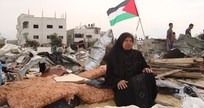
The United Nations Relief and Works Agency for Palestine Refugees in the Near East (UNRWA) declared on Sunday that it allocated US$6 million of its funds for the reconstruction of part of the destroyed areas in the Gaza Strip.
US$1.78 million are allocated for the reconstruction, while US$4.22 million are allocated for the rehabilitation of houses severely affected during the 2014 Israeli aggression.
A total of 1,095 refugee families will receive financial assistance through local banks, the agency said. Temporary housing solutions will be found during the reconstruction process, according to the UN agency.
US$1.78 million are allocated for the reconstruction, while US$4.22 million are allocated for the rehabilitation of houses severely affected during the 2014 Israeli aggression.
A total of 1,095 refugee families will receive financial assistance through local banks, the agency said. Temporary housing solutions will be found during the reconstruction process, according to the UN agency.
16 mar 2016
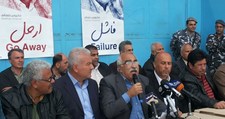
The Crisis Management Cell held on Tuesday a press conference in front of the main headquarters of UNRWA in Beirut in order to acquaint Palestinians as well as Lebanese people with the latest updates of the crisis.
The political official of the PFLP movement in Lebanon Samir Lubani recited a statement on behalf of the crisis management cell saying that the UNRWA’s latest resolutions aim at ending its work gradually in Lebanon which means neglecting the issue of the right of return.
Lubani affirmed that protest steps will continue until UNRWA withdraws its resolutions and guarantees the provision of all the needs of the Palestinian refugees.
For his part, the Hamas political official Ahmad Abdulhadi asked Mathias Shamali, the Director General of UNRWA in Lebanon, to quit due to his failure in providing any practical solution that meets the basic rights and demands of the Palestinian people.
Abu Iyad Shalan, Secretary of Fatah movement, said that the Palestinian factions will prepare a protest memo addressed to the UN Secretary General Ban Ki-moon who will be visiting Lebanon.
The letter includes filing a complaint to the United Nations for Human Rights organization against the UNRWA Director over his decisions, which Shalan said, lead to serious repercussions on the Palestinian refugees.
The political official of the PFLP movement in Lebanon Samir Lubani recited a statement on behalf of the crisis management cell saying that the UNRWA’s latest resolutions aim at ending its work gradually in Lebanon which means neglecting the issue of the right of return.
Lubani affirmed that protest steps will continue until UNRWA withdraws its resolutions and guarantees the provision of all the needs of the Palestinian refugees.
For his part, the Hamas political official Ahmad Abdulhadi asked Mathias Shamali, the Director General of UNRWA in Lebanon, to quit due to his failure in providing any practical solution that meets the basic rights and demands of the Palestinian people.
Abu Iyad Shalan, Secretary of Fatah movement, said that the Palestinian factions will prepare a protest memo addressed to the UN Secretary General Ban Ki-moon who will be visiting Lebanon.
The letter includes filing a complaint to the United Nations for Human Rights organization against the UNRWA Director over his decisions, which Shalan said, lead to serious repercussions on the Palestinian refugees.
7 mar 2016

The Action Group for Palestinians in Syria said that the Syrian security forces continue their mum about the fate of 1,061 Palestinian refugees in their prisons where hundreds of others died due to torture.
The Group said, in a statement on Sunday, that documenting such cases is too difficult in light of the tight-lipped policy of the security forces and due to the fact that the families of refugees refrain from talking on the arrest of their sons in and out of the camps for their safety.
The Group documented 186 cases of arrest in different refugee camps including 186 detainees in Aideen, 141 in Yarmouk, 107 in Khan al-Sheikh, 86 in Nayrab, 78 in Raml, 53 in Hamah, and 410 in other locations and camps.
The Group also underlined that the Palestinian refugees arrested in Syrian jails are exposed to torture and 435 of them died as a result of torture. 77 of them were recognized by their families through leaked photos.
The Group said, in a statement on Sunday, that documenting such cases is too difficult in light of the tight-lipped policy of the security forces and due to the fact that the families of refugees refrain from talking on the arrest of their sons in and out of the camps for their safety.
The Group documented 186 cases of arrest in different refugee camps including 186 detainees in Aideen, 141 in Yarmouk, 107 in Khan al-Sheikh, 86 in Nayrab, 78 in Raml, 53 in Hamah, and 410 in other locations and camps.
The Group also underlined that the Palestinian refugees arrested in Syrian jails are exposed to torture and 435 of them died as a result of torture. 77 of them were recognized by their families through leaked photos.
4 mar 2016
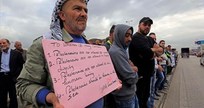
Dozens of Palestinian refugees Thursday demonstrated before the main headquarters of the UNRWA in Lebanon’s capital, Beirut.
The demonstration aimed at protesting against the reductions of health services provided by UNRWA for Palestinian refugees in Lebanon and against ignoring that problem.
The participants called on Arab and Muslim countries along with the United Nations to bear their responsibilities towards Palestinian refugees in diaspora. They warned of the the political dimensions for UNRWA’s measures on the Palestinian Question in general, on the right of return and the issue of refugees in particular.
The UNRWA's management in Lebanon issued a decision to adopt a new health regulation for Palestinian refugees through reducing the level of UNRWA’s coverage of health services provided for refugees.
Palestinian refugees refused the decision and organized a series of protest steps against it.
The demonstration aimed at protesting against the reductions of health services provided by UNRWA for Palestinian refugees in Lebanon and against ignoring that problem.
The participants called on Arab and Muslim countries along with the United Nations to bear their responsibilities towards Palestinian refugees in diaspora. They warned of the the political dimensions for UNRWA’s measures on the Palestinian Question in general, on the right of return and the issue of refugees in particular.
The UNRWA's management in Lebanon issued a decision to adopt a new health regulation for Palestinian refugees through reducing the level of UNRWA’s coverage of health services provided for refugees.
Palestinian refugees refused the decision and organized a series of protest steps against it.
26 feb 2016
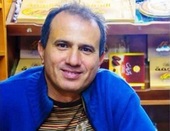
The Palestinian Authority (PA) has formed a committee to travel to the Bulgarian capital Sofia to investigate the circumstances that led to the death of ex-detainee Omar Nayef at the Palestinian embassy.
PA president Mahmoud Abbas condemned his death as "a reprehensible crime," and ordered an investigation into the reported murder of Nayef.
The Palestinian ministry of foreign affairs, for its part, said it launched an investigation into the incident and would stay in contact with its embassy and the local authorities in Sofia.
Nayef, who escaped from Israeli custody after being indicted for a 1986 murder, was found dead on Friday morning at the Palestinian embassy in Sofia.
Palestinian parties have accused the Mossad of assassinating Nayef, who took refuge in the embassy late last year fearing extradition to Israel.
PA president Mahmoud Abbas condemned his death as "a reprehensible crime," and ordered an investigation into the reported murder of Nayef.
The Palestinian ministry of foreign affairs, for its part, said it launched an investigation into the incident and would stay in contact with its embassy and the local authorities in Sofia.
Nayef, who escaped from Israeli custody after being indicted for a 1986 murder, was found dead on Friday morning at the Palestinian embassy in Sofia.
Palestinian parties have accused the Mossad of assassinating Nayef, who took refuge in the embassy late last year fearing extradition to Israel.
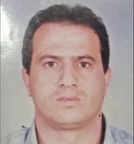
The Palestinian ex-prisoner Omar Nayef was assassinated Friday morning in the Palestinian embassy in Bulgaria, family sources revealed.
Imad Nayef, Omar’s brother, told the PIC reporter that the family was informed today morning that their son was assassinated in the Palestinian embassy in Sofia without revealing any further information.
Earlier in December, the Israeli ambassador to Sofia asked the Bulgarian authorities to hand over the Palestinian former prisoner Omar Nayef who lives with his family in Bulgaria since 1994. In a serious move, Bulgarian authorities detained Omar's older son in order to exert more pressure on him after he refused to hand himself in to the police.
Since then, Omar Nayef has taken refuge in the Palestinian embassy to escape extradition to Israel. Born in the occupied West Bank city of Jenin, Omar was convicted and sentenced by an Israeli court to life in prison in 1986 for carrying out an anti-occupation attack in occupation Jerusalem.
During his detention, Omar "had been beaten and tortured in prison. He was once put in solitary confinement for 60 days". Yet, in 1990, Nayef was able to escape from his guards during a hospital visit and eventually made it out of the country. After living in various other Arab countries for four years, he moved to Bulgaria in 1994 and was later granted permanent residency.
Related: Rally to protest Bulgaria’s extradition of Nayef to Israel
Imad Nayef, Omar’s brother, told the PIC reporter that the family was informed today morning that their son was assassinated in the Palestinian embassy in Sofia without revealing any further information.
Earlier in December, the Israeli ambassador to Sofia asked the Bulgarian authorities to hand over the Palestinian former prisoner Omar Nayef who lives with his family in Bulgaria since 1994. In a serious move, Bulgarian authorities detained Omar's older son in order to exert more pressure on him after he refused to hand himself in to the police.
Since then, Omar Nayef has taken refuge in the Palestinian embassy to escape extradition to Israel. Born in the occupied West Bank city of Jenin, Omar was convicted and sentenced by an Israeli court to life in prison in 1986 for carrying out an anti-occupation attack in occupation Jerusalem.
During his detention, Omar "had been beaten and tortured in prison. He was once put in solitary confinement for 60 days". Yet, in 1990, Nayef was able to escape from his guards during a hospital visit and eventually made it out of the country. After living in various other Arab countries for four years, he moved to Bulgaria in 1994 and was later granted permanent residency.
Related: Rally to protest Bulgaria’s extradition of Nayef to Israel
25 feb 2016
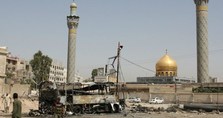
The United Nations Relief and Works Agency for Palestine Refugees (UNRWA) said on Thursday that 31 Palestinian refugees were killed and 28 others were injured in the Sayyida Zeinab bombing attack in Damascus.
UNRWA strongly condemned the parties responsible for the explosions that were triggered in the market area of Sayyida Zeinab in southern rural Damascus on 21 February, resulting in deaths and injuries among dozens of Syrian and Palestinian civilians.
While the toll of deaths and injuries is still being verified, with many still listed as missing, credible reports indicate that the explosions took the lives of some 120 people. Among those killed were 31 Palestinian refugees.
The number of people injured by the explosions is estimated at 150. These included 28 Palestinian refugees of whom 13 were children.
Eyewitnesses reported that on 21 February, three consecutive blasts in quick succession were detonated close to three primary schools in session. The explosions were profoundly traumatizing to everyone in the area, particularly to children.
In the aftermath of the blasts, an atmosphere of horror, disorientation and confusion prevailed in Sayyida Zeinab. In the strongest possible terms, UNRWA condemned the perpetrators of this mindless carnage, which was so deliberately calculated to kill and maim as many civilians as possible.
Such atrocious acts, as outrageous as they are, must not distract from the pursuit of a negotiated, peaceful and durable resolution of the armed conflict in Syria, the Agency added.
Through its humanitarian response activities and its health care, education and relief services, UNRWA vowed to continue to support and assist the 450,000 Palestine refugees in Syria, including those residing in Sayyida Zeinab.
UNRWA strongly condemned the parties responsible for the explosions that were triggered in the market area of Sayyida Zeinab in southern rural Damascus on 21 February, resulting in deaths and injuries among dozens of Syrian and Palestinian civilians.
While the toll of deaths and injuries is still being verified, with many still listed as missing, credible reports indicate that the explosions took the lives of some 120 people. Among those killed were 31 Palestinian refugees.
The number of people injured by the explosions is estimated at 150. These included 28 Palestinian refugees of whom 13 were children.
Eyewitnesses reported that on 21 February, three consecutive blasts in quick succession were detonated close to three primary schools in session. The explosions were profoundly traumatizing to everyone in the area, particularly to children.
In the aftermath of the blasts, an atmosphere of horror, disorientation and confusion prevailed in Sayyida Zeinab. In the strongest possible terms, UNRWA condemned the perpetrators of this mindless carnage, which was so deliberately calculated to kill and maim as many civilians as possible.
Such atrocious acts, as outrageous as they are, must not distract from the pursuit of a negotiated, peaceful and durable resolution of the armed conflict in Syria, the Agency added.
Through its humanitarian response activities and its health care, education and relief services, UNRWA vowed to continue to support and assist the 450,000 Palestine refugees in Syria, including those residing in Sayyida Zeinab.
24 feb 2016

Dozens of Palestinian refugees staged a sit-in before the American embassy in Beirut in response to a call for participating in the sit-in by the crisis management cell along with the UNRWA and representatives of Palestinian factions and popular committees in addition to refugees.
Salah al-Yusuf, member of the cell’s committee, said in a statement he read in the sit-in, that the escalatory steps in protest at the UNRWA’s arbitrary policy are ongoing.
He stressed on adhering to the rightful demands of Palestinian refugees on the levels of health and education services. Al-Yusuf called on the UNRWA’s administration to improve its services for refugees, and stressed that Palestinian refugees view UNRWA as being a witness on their catastrophe before the international community.
Salah al-Yusuf, member of the cell’s committee, said in a statement he read in the sit-in, that the escalatory steps in protest at the UNRWA’s arbitrary policy are ongoing.
He stressed on adhering to the rightful demands of Palestinian refugees on the levels of health and education services. Al-Yusuf called on the UNRWA’s administration to improve its services for refugees, and stressed that Palestinian refugees view UNRWA as being a witness on their catastrophe before the international community.

Sweden declared intention to increase its annual financial aid to the United Nations Relief and Work Agency for Palestinian refugees.
The aid’s value is 40 million and 600 thousand American dollars. The UNRWA said, in a statement on Tuesday, that the 15% increase made by Sweden is part of the Swedish support of the agency and sheds light on being a trusted partner in aiding Palestinian refugees.
Swedish Consul General, Anne Sophie Nelson, stressed that the Swedish decision of increasing UNRWA's funding demonstrates the importance Sweden pays to UNRWA and its work for Palestinian refugees.
Sweden is one of biggest financiers of UNRWA as the value of the Swedish donations to UNRWA’s program budget between 1993 and 2016 was estimated at 693 million dollars including the latest donation of 40 million and 600 thousand dollars.
The aid’s value is 40 million and 600 thousand American dollars. The UNRWA said, in a statement on Tuesday, that the 15% increase made by Sweden is part of the Swedish support of the agency and sheds light on being a trusted partner in aiding Palestinian refugees.
Swedish Consul General, Anne Sophie Nelson, stressed that the Swedish decision of increasing UNRWA's funding demonstrates the importance Sweden pays to UNRWA and its work for Palestinian refugees.
Sweden is one of biggest financiers of UNRWA as the value of the Swedish donations to UNRWA’s program budget between 1993 and 2016 was estimated at 693 million dollars including the latest donation of 40 million and 600 thousand dollars.
20 feb 2016

The United States is contributing US$47.7 million to the United Nations Relief and Works Agency for Palestine Refugees in the Near East (UNRWA) in response to the Agency’s 2016 Syria Regional Crisis Emergency Appeal, the UN agency declared on Saturday.
Of the total contribution, US$37.5 million will support the Agency’s emergency response activities inside Syria, where 450,000 Palestine refugees are estimated to remain. Over 60 per cent of Palestine refugees in Syria are internally displaced and an estimated 95 per cent are reliant on UNRWA for humanitarian assistance.
This includes tens of thousands who are trapped in areas of active conflict, with extremely constrained access to humanitarian assistance. US$10.2 million will go towards the Agency’s emergency interventions in Lebanon and Jordan. The vast majority of PRS in Lebanon and Jordan live a precarious, marginalized existence, unable to regularize their legal status or access civil registration procedures and basic social services.
They are largely dependent on UNRWA for basic subsistence needs, including food and shelter, as well as basic education and health care. In 2016, UNRWA is appealing for US$414 million to meet the minimum humanitarian needs of Palestine refugees affected by the ongoing conflict in Syria.
Of the total contribution, US$37.5 million will support the Agency’s emergency response activities inside Syria, where 450,000 Palestine refugees are estimated to remain. Over 60 per cent of Palestine refugees in Syria are internally displaced and an estimated 95 per cent are reliant on UNRWA for humanitarian assistance.
This includes tens of thousands who are trapped in areas of active conflict, with extremely constrained access to humanitarian assistance. US$10.2 million will go towards the Agency’s emergency interventions in Lebanon and Jordan. The vast majority of PRS in Lebanon and Jordan live a precarious, marginalized existence, unable to regularize their legal status or access civil registration procedures and basic social services.
They are largely dependent on UNRWA for basic subsistence needs, including food and shelter, as well as basic education and health care. In 2016, UNRWA is appealing for US$414 million to meet the minimum humanitarian needs of Palestine refugees affected by the ongoing conflict in Syria.

The Palestinian refugees in Lebanon have submitted a letter over the UNRWA service cuts to the European Commission (The European Union mission) in Beirut.
This came during a sit-in staged on Friday outside the headquarters of the Commission in protest at the UNRWA's decision to reduce the services it provides for the Palestinian refugees in Lebanon.
The letter stressed the refugees' rejection of the UNRWA's measures that led to the reduction of its health and educational services, froze the reconstruction of Nahr al-Bared refugee camp and stopped providing aid for the displaced Palestinians coming from Syria.
In a speech delivered during the sit-in, spokesman for the refugee Mahmoud Hamad called for more support for the refugees in Lebanon and improving the health and educational services provided for them.
Later, representatives of the refugees handed over a memorandum of demands to an official from the European Commission Palestinian refugees had closed earlier on the same day all headquarters of the UNRWA in Lebanon in protest at its recent measures against the refugees.
This came during a sit-in staged on Friday outside the headquarters of the Commission in protest at the UNRWA's decision to reduce the services it provides for the Palestinian refugees in Lebanon.
The letter stressed the refugees' rejection of the UNRWA's measures that led to the reduction of its health and educational services, froze the reconstruction of Nahr al-Bared refugee camp and stopped providing aid for the displaced Palestinians coming from Syria.
In a speech delivered during the sit-in, spokesman for the refugee Mahmoud Hamad called for more support for the refugees in Lebanon and improving the health and educational services provided for them.
Later, representatives of the refugees handed over a memorandum of demands to an official from the European Commission Palestinian refugees had closed earlier on the same day all headquarters of the UNRWA in Lebanon in protest at its recent measures against the refugees.
19 feb 2016
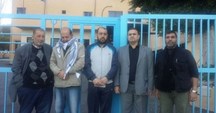
Palestinian refugees in Lebanon closed on early Friday morning all the UNRWA offices in protest at the agency’s cuts of its health services.
The Palestinian refugees in Lebanon said the move comes against the backdrop of UNRWA's reducing support for Palestinian refugees in Lebanon and also for the delay in the reconstruction of the Nahr al-Bared refugee camp along with the suspension of aid for refugees fleeing war-torn Syria.
Overnight, the refugees rallied outside the bus stations leading to the UNRWA’s offices, preventing the agency’s staff from reaching their workplaces. A sit-in is expected to be held by the Palestinian refugees in Lebanon outside of the European Union headquarters in Beirut at 10 a.m. on Friday.
The Palestinian refugees in Lebanon said the move comes against the backdrop of UNRWA's reducing support for Palestinian refugees in Lebanon and also for the delay in the reconstruction of the Nahr al-Bared refugee camp along with the suspension of aid for refugees fleeing war-torn Syria.
Overnight, the refugees rallied outside the bus stations leading to the UNRWA’s offices, preventing the agency’s staff from reaching their workplaces. A sit-in is expected to be held by the Palestinian refugees in Lebanon outside of the European Union headquarters in Beirut at 10 a.m. on Friday.
17 feb 2016

Palestinian refugees in Lebanon banned on Wednesday morning UNRWA’s Director-General, Mattias Shamali, and a number of senior officials from entering the agency’s office in Kharub region in protest at the UNRWA’s cuts of its health services.
Palestinian refugees have been rallying since the early morning hours outside the UNRWA headquarters and prevented the personnel from getting into the building against the backdrop of UNRWA's reducing support for Palestinian refugees in Lebanon.
The crisis management cell and the UNRWA are expected to hold a press conference at 11 a.m. on Wednesday in front of the UNRWA’s office. For his part, head of the Palestine Land Commission in London, Salman Abu Sitta, said the financial and political crisis endured by the UNRWA is of a preplanned nature and aims at liquidating the agency, which derives its legitimacy from the U.N. Resolution 194.
The activist said Resolution 194, which resolves that refugees wishing to return to their homes should be permitted to do so at the earliest practicable date, has been the permanent target of Israel’s lobby at the U.S. Congress.
He slammed the biased policy pursued by the U.S. administration, which has been paying an annual sum of $1,000 per every single Israeli as opposed to $75 only per every single Palestinian. He spoke out against the world’s superpowers and western governments that have not been up to their ethical and financial commitments as regards Palestinian refugees.
Palestinian refugees have been rallying since the early morning hours outside the UNRWA headquarters and prevented the personnel from getting into the building against the backdrop of UNRWA's reducing support for Palestinian refugees in Lebanon.
The crisis management cell and the UNRWA are expected to hold a press conference at 11 a.m. on Wednesday in front of the UNRWA’s office. For his part, head of the Palestine Land Commission in London, Salman Abu Sitta, said the financial and political crisis endured by the UNRWA is of a preplanned nature and aims at liquidating the agency, which derives its legitimacy from the U.N. Resolution 194.
The activist said Resolution 194, which resolves that refugees wishing to return to their homes should be permitted to do so at the earliest practicable date, has been the permanent target of Israel’s lobby at the U.S. Congress.
He slammed the biased policy pursued by the U.S. administration, which has been paying an annual sum of $1,000 per every single Israeli as opposed to $75 only per every single Palestinian. He spoke out against the world’s superpowers and western governments that have not been up to their ethical and financial commitments as regards Palestinian refugees.
15 feb 2016

A senior Hamas delegation headed by Mousa Abu Marzouk, political bureau member of the Movement, met with Lebanese officials in Beirut over pro-Palestine support.
The Hamas delegation met with the Lebanese Prime Minister Tamam Salaam and the President of the Lebanese-Palestinian Dialogue Committee Hassan Mneimneh.
Both parties discussed the latest developments emerging on the Palestinian and Lebanese socio-political scene and the UNRWA cuts of its health services for Palestinian refugees.
The delegation further met with Fouad Siniora, former Lebanese Prime Minister and leader of the Future Parliamentary Bloc. Both sides discussed the situation in the Palestinian refugee camps and the serious repercussions of the UNRWA cuts.
Abu Marzouk also held talks with the President of the International Federation of Resistance Scholars, Sheikh Maher Hammoud, who stressed the importance of the Palestinian resistance in the face of the Israeli occupation. The Hamas delegates further met with the head of the Jama’a Islamiya, Azzam al-Ayoubi, and the Palestinian ambassador in Lebanon.
Abu Marzouk and his accompanying Hamas representatives paid a visit to the Palestinian refugees rallying outside the UNRWA headquarters in Lebanon and expressed Hamas’s support for their protest against the UNRWA cuts. The senior Hamas official also popped in the Nahr el-Bared refugee camp and kept record of the tragic circumstances endured by the Palestinian refugees there.
The Hamas delegation met with the Lebanese Prime Minister Tamam Salaam and the President of the Lebanese-Palestinian Dialogue Committee Hassan Mneimneh.
Both parties discussed the latest developments emerging on the Palestinian and Lebanese socio-political scene and the UNRWA cuts of its health services for Palestinian refugees.
The delegation further met with Fouad Siniora, former Lebanese Prime Minister and leader of the Future Parliamentary Bloc. Both sides discussed the situation in the Palestinian refugee camps and the serious repercussions of the UNRWA cuts.
Abu Marzouk also held talks with the President of the International Federation of Resistance Scholars, Sheikh Maher Hammoud, who stressed the importance of the Palestinian resistance in the face of the Israeli occupation. The Hamas delegates further met with the head of the Jama’a Islamiya, Azzam al-Ayoubi, and the Palestinian ambassador in Lebanon.
Abu Marzouk and his accompanying Hamas representatives paid a visit to the Palestinian refugees rallying outside the UNRWA headquarters in Lebanon and expressed Hamas’s support for their protest against the UNRWA cuts. The senior Hamas official also popped in the Nahr el-Bared refugee camp and kept record of the tragic circumstances endured by the Palestinian refugees there.
12 feb 2016

The Syrian civil war has claimed the lives of 3,089 Palestinian refugees since it started in 2011, 1,200 of them in al-Yarmouk camp, south of Damascus, according to a recent human rights report.
The hostilities in Syria displaced 200,000 Palestinians, over 71,000 of them managed to reach Europe, the report stated.
This came in the recent biannual report, which was released by the Action Group for the Palestinians of Syria and the London-based Palestinian Return Center.
The report, which is composed of 146 pages, has documented several violations and events that happened to Syria's Palestinian refugees inside and outside the war-torn country during the second half of 2015.
The hostilities in Syria displaced 200,000 Palestinians, over 71,000 of them managed to reach Europe, the report stated.
This came in the recent biannual report, which was released by the Action Group for the Palestinians of Syria and the London-based Palestinian Return Center.
The report, which is composed of 146 pages, has documented several violations and events that happened to Syria's Palestinian refugees inside and outside the war-torn country during the second half of 2015.
